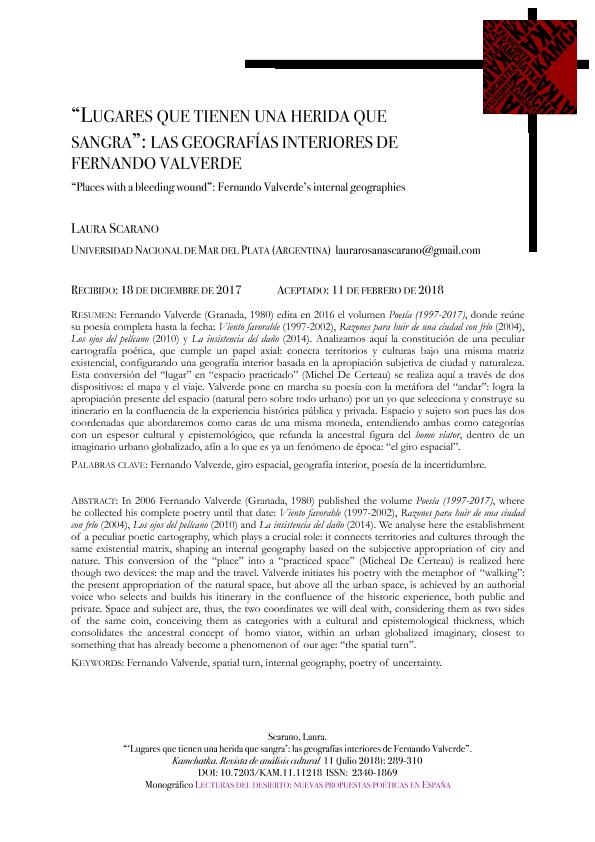Mostrar el registro sencillo del ítem
dc.contributor.author
Scarano, Laura Rosana

dc.date.available
2020-04-03T15:13:25Z
dc.date.issued
2018-07
dc.identifier.citation
Scarano, Laura Rosana; "Lugares que tienen una herida que sangra": Las geografías interiores de Fernando Valverde; Universidad de Valencia; KAMCHATKA; 11; 7-2018; 289-310
dc.identifier.issn
2340-1869
dc.identifier.uri
http://hdl.handle.net/11336/101804
dc.description.abstract
Fernando Valverde (Granada, 1980) reúne en 2016 su poesía completa hasta la fecha: Viento favorable (1997-2002), Razones para huir de una ciudad con frío (2004), Los ojos del pelícano (2010) y La insistencia del daño (2014). Analizamos aquí la constitución de una peculiar cartografía poética, que cumple un papel axial: conecta territorios y culturas bajo una misma matriz existencial, configurando una geografía interior basada en la apropiación subjetiva de ciudad y naturaleza. Esta conversión del ?lugar? en ?espacio practicado? (Michel De Certeau) se realiza aquí a través de dos dispositivos: el mapa y el viaje. Valverde pone en marcha su poesía con la metáfora del ?andar?: logra la apropiación presente del espacio (natural pero sobre todo urbano) por un yo que selecciona y construye su itinerario en la confluencia de la experiencia histórica pública y privada. Espacio y sujeto son pues las dos coordenadas que abordaremos como caras de una misma moneda, entendiendo ambas como categorías con un espesor cultural y epistemológico, que refunda la ancestral figura del homo viator, dentro de un imaginario urbano globalizado, afín a lo que es ya un fenómeno de época: "el giro espacial".
dc.description.abstract
: In 2006 Fernando Valverde (Granada, 1980) published the volume Poesía (1997-2017), where he collected his complete poetry until that date: Viento favorable (1997-2002), Razones para huir de una ciudad con frío (2004), Los ojos del pelícano (2010) and La insistencia del daño (2014). We analyse here the establishment of a peculiar poetic cartography, which plays a crucial role: it connects territories and cultures through the same existential matrix, shaping an internal geography based on the subjective appropriation of city and nature. This conversion of the “place” into a “practiced space” (Micheal De Certeau) is realized here though two devices: the map and the travel. Valverde initiates his poetry with the metaphor of “walking”: the present appropriation of the natural space, but above all the urban space, is achieved by an authorial voice who selects and builds his itinerary in the confluence of the historic experience, both public and private. Space and subject are, thus, the two coordinates we will deal with, considering them as two sides of the same coin, conceiving them as categories with a cultural and epistemological thickness, which consolidates the ancestral concept of homo viator, within an urban globalized imaginary, closest to something that has already become a phenomenon of our age: “the spatial turn”.
dc.format
application/pdf
dc.language.iso
spa
dc.publisher
Universidad de Valencia
dc.rights
info:eu-repo/semantics/openAccess
dc.rights.uri
https://creativecommons.org/licenses/by-nc-sa/2.5/ar/
dc.subject
LUGARES
dc.subject
POESIA
dc.subject
FERNANDO VALVERDE
dc.subject
POESIA ANTE LA INCERTIDUMBRE
dc.subject.classification
Literaturas Específicas

dc.subject.classification
Lengua y Literatura

dc.subject.classification
HUMANIDADES

dc.title
"Lugares que tienen una herida que sangra": Las geografías interiores de Fernando Valverde
dc.title
“Places with a bleeding wound”: Fernando Valverde’s internal geographies
dc.type
info:eu-repo/semantics/article
dc.type
info:ar-repo/semantics/artículo
dc.type
info:eu-repo/semantics/publishedVersion
dc.date.updated
2020-04-02T13:58:25Z
dc.journal.volume
11
dc.journal.pagination
289-310
dc.journal.pais
España

dc.journal.ciudad
Valencia
dc.description.fil
Fil: Scarano, Laura Rosana. Consejo Nacional de Investigaciones Científicas y Técnicas. Centro Científico Tecnológico Conicet - Mar del Plata; Argentina. Universidad Nacional de Mar del Plata. Facultad de Humanidades. Departamento de Letras. Centro de Letras Hispanoamericanas; Argentina
dc.journal.title
KAMCHATKA
dc.relation.alternativeid
info:eu-repo/semantics/altIdentifier/url/https://ojs.uv.es/index.php/kamchatka/article/view/11218
dc.relation.alternativeid
info:eu-repo/semantics/altIdentifier/doi/http://dx.doi.org/10.7203/KAM.11.11218
Archivos asociados
